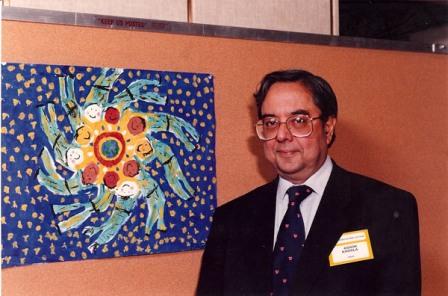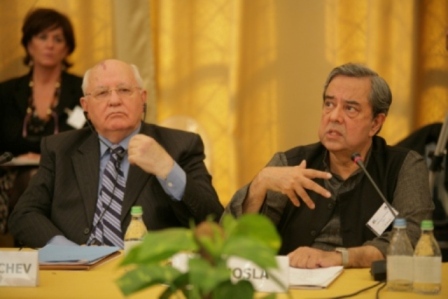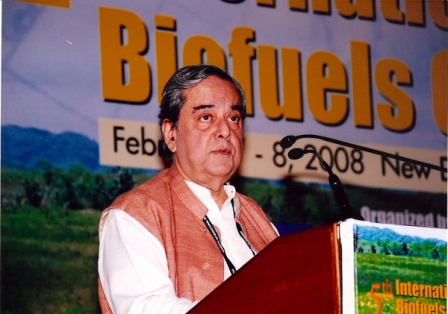Contribute
| In Conversation With Dr. Ashok Khosla |
Ranjani Saigal
10/30/2008
(Dr. Khosla is the featured speaker at the IITSINE Keynote Series Dinner to be held on Friday Nov 14 2008 , Bedford, MA Click here to register)
Dr. Ashok Khosla is the Chairman and CEO of Development Alternatives, a company whose core mission is sustainable development. The British Government recently granted him the Order of the British Empire.He is currently serving as President of the prestigious International Union for Conservation of Nature (IUCN). Earlier, he was Director of Office of Environment, Government of India, and Director, Infoterra in the United Nations Environment Program. Ashok Khosla studied at the Universities of Cambridge and Harvard. He was awarded the Stockholm Challenge Award in 2002, the UN Sasakawa Environment Prize in 2002 (considered the Nobel Prize in Environment) and the Schwab Foundation's Award for Social Entrepreneur of the Year.
He was born in Kashmir and currently lives in New Delhi, India.
Congratulations on being elected President of IUCN. What do hope to accomplish in this role?
Thank you! Right at this moment, the world is facing several crises at once. Among them, most of us are highly familiar with the financial crisis, some of us have some acquaintance with the climate crisis but few of us really know anything about the ecosystem crisis: the extreme threat of extinction facing many of our species, the rapid destruction of the habitats which they need for their survival and the loss of ecosystem services that sustain them.
It is my hope that over the next few years, IUCN will be able to able to mobilize the policies, resources and action needed to reverse this trend – before they become irreversibly lost.
Could you tell us about your organization Development Alternatives?
Development Alternatives is a “social enterprise†set up 25 years ago to create jobs for poor people in rural communities and, at the same time, to produce the goods and services they need in their everyday lives. It has a very strong research wing that develops new technologies and a marketing wing that makes and sells these technologies to local “mini-enterprises†working in the rural economy of India. It is the world’s leader in developing and delivering a wide variety of technologies for production of building materials, energy, clean water, handloom textiles, recycled paper, and other products, as well as livelihoods.
How do you convince investors, whose motives are mostly pure profit, to fund the social enterprises like Tara and Tarahaat?
It’s not easy. It also depends on the interests of the particular investor one is talking to. For the ones that have some commitment to social responsibility, I try to explain to that by investing in social enterprises, they are creating additional purchasing power and therefore markets which will raise the general economic level and increase the returns on their investments. For those that have only profit maximization in mind, there are lots of other benefits that should be of interest to them – the availability of inputs to their other industries, a growing pool of well-trained workers for their other industries and a more stable society in which to produce and market their products.
What is the greatest challenges for energy in the Urban and Rural areas of India?
To bring the Grid to every community in India will require huge investments and take a lot of time, neither of which the people of the country can afford. Right now, the answer to this lies in encouraging the setting up of decentralized power generation and distribution facilities that use renewable fuels. The challenge is to put in place policies, incentives and technology supports that make this possible.
"Sustainability" has become one of the hottest issue in the business world. What would be the top five pieces of advice you would give to technology and business world in the US that has been shaken by financial and energy crisis based on your 25 years of experience?
First, that no finite resource base can sustain infinite economic growth. At some point, growth has to level off, which means growth rates have to decline. This means that one of the fundamental tenets of business, continuous growth and mindless pursuit of dominant market share cannot be the basis of a business model that is sustainable.
Second, that “efficiency†achieved by passing any of the costs of doing business off on to others (such as emitting pollution, dumping wastes, selling short term gains at the expense of long term losses) is also not sustainable.
Third, that any business model that ignores certain risks and costs and inflates the potential earnings is bound to fall flat on its face sooner rather than later.
Fourth, complete absence of regulation and total laissez-faire in the environmental performance of companies will surely rebound to their disadvantage in the long run.
Fifth, conservation of energy, water and materials is not only an environmental imperative now, but also very good business.
Social Entrepreneurship has entered the vision statement of the US Presidential candidates. What major lessons from your work addressing the rural poor in India can you share with the next US President as he tries to remove poverty from the United States?
Using business, or market-based methods can, indeed, be very effective instruments to solve social and environmental problems. However, being generally small and local, enterprises that try to do this do not have the technical, financial or marketing expertise or resources to be commercially viable. Any society, and those who are in government, must set up the mechanisms to provide support to mini enterprises that enables them to access technology and after sales services, capital and marketing channels. If the next President would set up mechanisms to provide such support to mini enterprises, he would quickly initiate the economic processes needed to remove poverty and regenerate the environment.
What would you consider your most significant accomplishment?
Setting up an organization, Development Alternatives, that is able to attract world class professionals who can profitably deliver quality products and services to clients who live on less than one dollar a day. The profits may be modest, but the impacts on lives and the economies can be significant.
You may also access this article through our web-site http://www.lokvani.com/


